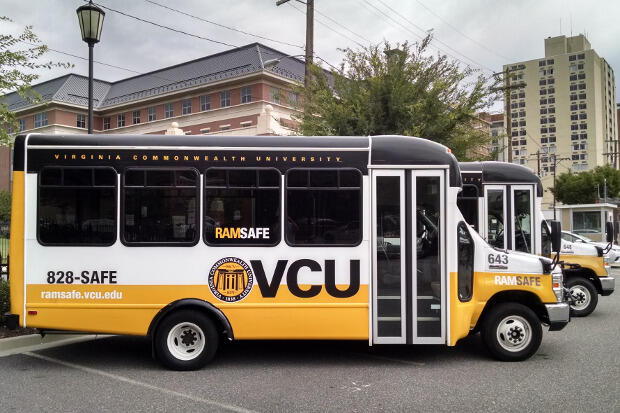
Aug. 25, 2015
VCU Parking and Transportation takes green leap into alternative fuels
Seven RamSafe buses retrofitted for liquid propane fuel
Share this story
Virginia Commonwealth University Parking and Transportation has converted 70 percent of its RamSafe fleet to operate on liquid propane bi-fuel through a partnership with the Virginia Department of General Services; the Virginia Department of Mines, Minerals and Energy; Alliance AutoGas and Virginia Clean Cities. The conversion is projected to save the division more than $20,000 in annual fuel costs.
VCU Parking and Transportation operates RamSafe as a point-to-point evening transportation service for students, faculty and staff 365 days per year. Service is offered within defined boundaries on the Monroe Park and MCV campuses with the majority of the requested trips traveling to and from university-owned buildings and residential housing. Annually, the RamSafe fleet travels approximately 150,000 miles.
This LP conversion marks the first significant step VCU Parking and Transportation has taken in efforts to operate a more sustainable fleet. It puts the university one step closer to its goal of reducing its greenhouse gas emissions to 30 percent below business-as-usual emissions by 2025.
VCU is a great setting to support alternate fuel usage.
“The decision to invest in a more sustainable fleet simply made a lot of sense,” said Craig Willingham, fleet manager at VCU. “VCU is a great setting to support alternate fuel usage. In addition to promoting a safer environment and cleaner burning fuels within the vehicle fleet, there are opportunities for cost savings.”
The requisition for the conversion was completed through a state contract with Alliance AutoGas, which also serves as the official propane provider.
“As the country’s leading autogas conversion provider, Alliance AutoGas is honored to be part of VCU’s launch into alternative fuels,” said Ed Hoffman, president of Blossman Services Inc., equipment supplier for Alliance AutoGas. “Our turnkey solution will enable VCU to improve its carbon footprint with clean and domestic propane autogas.”
“This cost-effective, innovative approach provides our partners the infrastructure needed to easily adopt the use of alternative fuel vehicles,” said Richard F. Sliwoski, director of the Department of General Services, which, through its Office of Fleet Management Services, operates the LP fuel site where RamSafe buses are fueled. “We’re pleased that VCU can use the solutions we’ve put in place to remove some of the obstacles of converting to alternative fueled vehicles.”
Virginia Clean Cities, which assists in the improvement of the commonwealth’s air quality through the promotion of alternative fuel, also worked with VCU Parking and Transportation to identify incentives as part of the overall state transition to alternative fuel.
“Virginia Clean Cities is proud of VCU’s efforts with these new, clean-fuel vehicles,” said Alleyn Harned, executive director. “These conversions let us use a cleaner domestic fuel and reduce air pollution while improving our energy and economic security.”
VCU’s Willingham noted that these conversions mark just the beginning of the many opportunities to expand alternative fuel usage at VCU. Ultimately, the division looks to increase the number of alternative fueled vehicles across the entire fleet with hopes of VCU one day being recognized as a sustainable fleet within the industry.
Reimbursement for conversion costs will be provided through a Congestion Mitigation and Air Quality grant offered by the Virginia Department of Mines, Minerals and Energy.
For more information on VCU Parking and Transportation, visit www.parking.vcu.edu.
About VCU and VCU Medical Center
Virginia Commonwealth University is a major, urban public research university with national and international rankings in sponsored research. Located in downtown Richmond, VCU enrolls more than 31,000 students in 226 degree and certificate programs in the arts, sciences and humanities. Sixty-seven of the programs are unique in Virginia, many of them crossing the disciplines of VCU’s 13 schools and one college. MCV Hospitals and the health sciences schools of Virginia Commonwealth University comprise VCU Medical Center, one of the nation’s leading academic medical centers. For more information, see www.vcu.edu.
Subscribe to VCU News
Subscribe to VCU News at newsletter.vcu.edu and receive a selection of stories, videos, photos, news clips and event listings in your inbox.












